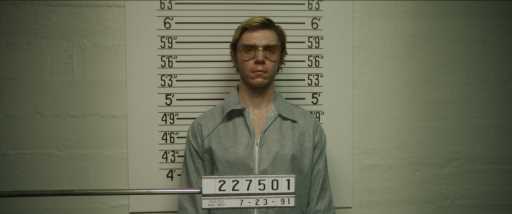Evan Peters has played an assortment of twisted characters in Ryan Murphy productions, from a cult leader to the ghost of a murderer, not to mention a serial killer-turned-hotelier. But Dahmer – Monster: The Jeffrey Dahmer Story called on the actor to plumb new depths of depravity to embody a creature not of the imagination, but of grim reality. To portray the real-life serial killer, Peters channeled Dahmer’s distinctive Wisconsin accent and chillingly detached demeanor, going so far as to strap lead weights around his arms and pack weights into his shoes to capture Dahmer’s robotic physicality.
Related Story
‘The Last Of Us’ Stars Pedro Pascal And Bella Ramsey On The Fame And Attention That Comes Along With The End Of The World
DEADLINE: How did you get into the mindset so that you could play this character convincingly? In some ways you’re really underplaying him.
EVAN PETERS: It was really just doing as much research as I possibly could on the case, finding out the facts of the case, timelines, really digging into that. It’s such an absolutely tragic and overwhelming case that one of the things I was really trying to do was get out of the way of it — let the facts and the writing and the series speak for itself.
DEADLINE: One of unusual things about Dahmer was that he seemed to have a kind of perplexity about his own behavior.
PETERS: One of the keys to unlocking the character was that, from all the research and interviews, you do see that he has a form of regret and really a confusion about why he even wanted to do what he did, his understanding that it was wrong and his struggle with it and self-medicating with alcohol, and ultimately choosing to cross over the moral code that we all have and to commit these atrocious acts. It was really a deterioration into a compulsion, mixed with his worsening alcoholism. He just completely lost himself and couldn’t control it anymore. He’s definitely confused about why he even wanted to do that.
DEADLINE: Were there particular scenes in the series that were the hardest to shoot?
PETERS: They were all hard, but I think Episode 6 [about Dahmer and one of his victims, Tony Hughes, a Deaf aspiring model] was a very difficult episode to shoot, just very affecting emotionally for me as a person.

DEADLINE: There are actors who have taken on really scary roles like this, sometimes based on real people. You’re unusual in that you’ve been willing to do this more than once. I think most actors would say, “I’m going to do this one time. Never again.”
PETERS: Prior to reading this series, I said, “All right, I’m going to take a break from playing the darker characters and really explore the light.” And then, of course, I read it and the writing was brilliant and very careful to show many different perspectives, not just Dahmer’s — trying to illuminate how the system tragically failed the victims’ family members, neighbors who tried to sound the alarm, because of prejudice. I was in a state of stunned disbelief after I read it and continue to be. I just felt really compelled to do it because I didn’t know the case, I didn’t know any of the details. I felt changed by it and I sincerely hoped that some good would come out of it if people watched it. So, that’s why I signed on to do this one. I said, “OK, now this will be the last one.”
DEADLINE: There’s a kind of blankness to Dahmer. Yet, as the lead in a series, by definition you have to be compelling, otherwise no one’s going to be drawn into it. How do you remain true to this character who is not flashy, but make it compelling?
PETERS: That was definitely a challenge. I felt like the way Jeffrey Dahmer reacts in a situation is completely different from how you or I would react. His emotions, in a lot of the footage that you see, he does seem to be fairly affectless. Even when he is speaking about regret, it seems to be a fraction of what you or I would be expressing or feeling. Again, a detachment from what he was doing. It was really trying to remember that a lot of that footage and things that you read, was after he was arrested and he’s medicated and not drinking. So, it was almost a case of working backwards from there… It was a lot of exploration with all of the directors in having the emotion and then swallowing it, then seeing how it bubbled up, and being surprised by that and where it came out. That was something that we felt was right for a lot of these scenes.
There was another element to it as well, that there’s a private Jeffrey Dahmer and a public Jeffrey Dahmer. How he’s acting behind closed doors is completely different from how he’s acting in front of a camera for the interviews or the detectives interviewing him, or even for that very short home video footage online of him where he seems completely normal — quiet — but very, very normal. It was just exploring that as well, being very specific about the relationships with all of the people in his life and the lies that he was telling them to hide the private Jeffrey Dahmer.
DEADLINE: You’ve had a long association with producer Ryan Murphy. What do you think he saw in you when you were a young unknown actor?
PETERS: According to him, he saw that I resembled Jessica Lange slightly, and that was the real reason he cast me in that role [Tate Langdon opposite Lange’s Constance Langdon in American Horror Story: Murder House]. I really don’t know. I just know that I really love working with Ryan Murphy. I find him to be an incredibly caring, loyal and collaborative creator, director, producer. He gives you the freedom to explore and take risks and do your work, do your process, all the while being there to help and give his input, which, by the way, is usually 10 times better than anything you could have ever thought of. You’re sitting there listening and watching, going, “Yes, please, give me more ideas.” I feel very, very, very grateful that he gave me that initial opportunity to work on Horror Story and continues to give me opportunities.

DEADLINE: The Dahmer shoot was quite lengthy, around six months. How do you decompress from something like that?
PETERS: It’s just like running a marathon. You see that finish line and you’re just giving everything to get there. And then once you’re there, you just let it all go. You have to try to decompress and that’s of course easier said than done. I think that it’s hanging out with family and friends, going back to St. Louis. Throughout shooting and four months prior to shooting, you’re putting all of this case in your mind, in your being. You’re absorbing all of this really tragic information. It was really just a matter of changing that and starting to put in some comedies or lighter music and trying to think about other things.
DEADLINE: In Mare of Easttown you really got to show another side of your talent, playing quite a sweet guy, the detective Colin Zabel, opposite Kate Winslet as Mare. Was it a bit of a relief to play someone lighter?
PETERS: It definitely was. It was also terrifying because you’re working with Kate Winslet. It was really a dream come true. I still really haven’t fully processed that we were able to work together and have scenes together. It was just such a surreal, amazing experience. I’ve said it before, but she really exceeded every expectation. I learned a lot from her, and I really looked up to her and I try to channel her, like, “What would Kate do?” Incredible endurance and a great leader and kind person and really the gold standard. Again, I was terrified to work on scenes with her but quickly found that she was very welcoming and warm and amazing. But I was still terrified to do the scenes, to get them right, because she’s also one of the best, if not the best actress that there is. It was an incredible amount of pressure, but yeah, it was really nice to just play somebody who was normal.
Must Read Stories
Sony Pulls Bad Bunny’s Spider-Man Universe Movie ‘El Muerto’ From Schedule

FTC Sues Amazon: “Tricked And Trapped” Customers With Prime Subscription Tactics

Hulu Sets Season 2 Of ‘Nine Perfect Strangers’ With Nicole Kidman Returning; 5 Others Cast

Lorne Michael Gives First Details About 50th Anniversary Bash At Radio City Next Year

Read More About:
Source: Read Full Article


